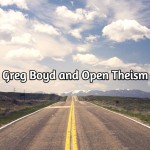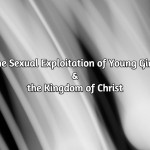Our culture is obsessed with two realities. Hollywood is intrigued by the idea of invisible spiritual powers. Many examples could be brought to the surface, but my favorite would be “The Exorcism of Emily Rose.” A second cultural observation is that we also have a deep concern about systemic evil and global poverty. Bono of U2 and (RED)… need I saw more (except to add that today is World AIDS Day and you can help!)?
Today I am going to start a series that builds off of those two cultural observations. For those of you who are familiar with my writings, you are aware that I hold to nonviolence and anti-nationalism. But, there is a warfare that is to be waged by Christians – spiritual warfare. During this series (which may last for a while), we are going to explore this theme based on Ephesians 6.10-18. I will be suggesting that there is an inherent link between spiritual warfare and justice; based on how I interpret this text.
Before we get ahead of ourselves, I want to lay a foundation for understanding how the demonic operates in our world. So, in this post I want to offer some common language to guide us forward. The first thing that we need to get on the same page about is that I will use demon language interchangeably with language of “powers.” Second, I want to take the rest of this post to talk about how these “powers” (demons / fallen angels) operate in our world and are determined to corrupt God’s creation.
#1 Tormenting individual people; both Christians and non-Christians alike
Here we can think of Mark 5 and the man “possessed” by a legion of demons. There is no doubt as we read a text like this that the demonic beings can invade individual persons. In my own life, I have seen the demonic at work in nightmares and even through feeling their presence; and other people who are close to me have actually seen demons. But, there is one assumption that I want to briefly deconstruct and that is the idea that a Christian can never be possessed (the word used in verse 15 of Mark 5). I actually agree with this, except I think we need to re-frame the language we use to express this.
The common way Christians have talked about this issue is: “A Christian can’t be demon possessed, because we are possessed by God’s Spirit.” I’m convinced that using the language of “demon possession” is confusing when we consider what the literal rendering of the original language of Greek is. The word being used here is daimonizomai, which is should be defined as “one-being-demonized OR having a demon.” Some of my Greek scholars may disagree, but many of the sources I have read affirm this. Not only so, but story after story is told of Christians throughout history and into the modern day that have “had a demon” that needed to be exorcized. I want to suggest that no one is ever literally completely “possessed” by a demon, but what we often have called “demon possession” should be referred to as a person being “demonized.” And yes, it’s true that a Christian is possessed by the Holy Spirit, however, in our fallen world with bodies that are still corrupted by sin, no one is exempt from the threats of demonization (although the most sever cases seem to be rare). The only difference is, that if we have a relationship with Jesus, we know how to overcome the powers of darkness – by allowing the life of Jesus to live in and through us!
#2 Disrupting God’s intended pattern for nature
The second area that the powers distort God’s creation is through the disruption of nature. One place where we get a glimpse of this is in the story of Jesus’ rebuking of the storm in Mark chapter 4. Without turning there, it’s helpful to note a couple of things from the story. First, is that the “sea” in the mind of a first century Jew came to symbolize the dark uncontrollable forces of evil. Second, Jesus “rebukes” the storm, in the same way that he “rebukes” evil spirits when individuals are liberated from the bondage of demonization. What we have in Mark 4 is a picture of how Satanic Evil is behind the distortion of weather patterns in our world. Keeping this in mind, we need to understand that when a natural disaster happens in our world, it’s not a matter of “God’s will,” but rather this is an attempt by the Demonic Powers to corrupt God’s plan for nature. The Demonic powers are what influence the cosmic imbalances we face.[1]
#3 Influencing and manipulating nations, institutions, and systems that cause social injustice
Finally, based on my reading of Ephesians 6, I will be exploring the link between the demonic and injustice. In the ancient world, it was believed that behind the rulers and kings, there was a direct influence from either the powers of good (God and his angels), or the powers of evil. We find multiple examples of this throughout the Old Testament. Some people often refer to these kinds of “evil Powers” as: Territorial Spirits. In Daniel 10.12-13 we get a glimpse of this type of systemic spiritual influence (this will conscept will be unpacked out of Ephesians with greater detail). Apparently in this situation there was a “spirit prince” who was blocking the work of God in the area of Persia. The system of Government in Persia was being manipulated or influenced by Demonic Powers. This is one of many examples of this idea of there being “territorial spirits” or demonic powers that are what we might call: institutional. Their goal seems to be to disrupt governments and organizations from doing good in the world, and helping them lean towards evil. This doesn’t mean that the various people who are part of such an organization or government or system are themselves being personally “demonized” (although this can be the case at times); but that the ethos of certain situations collectively can cause evil in systems that are unjust. I submit to you that there is a deeper influence in these situations than we often realize.
So, I have just laid out a foundation to discuss the evil fallen powers or demons. They are personal, they corrupt nature, and they tilt systems toward evil. In the following weeks, we will explore Ephesians 6 and ask some important questions that are lingering for us at this point. These include:
Why doesn’t God just destroy the ‘evil’ powers?
How did Jesus’ death and resurrection deal with the ‘evil’ powers?
Can the Church make a difference to undo the work of the powers?
[1] For a wonderful sermon on this subject see Greg Boyd’s message “A War-Torn Creation.”












